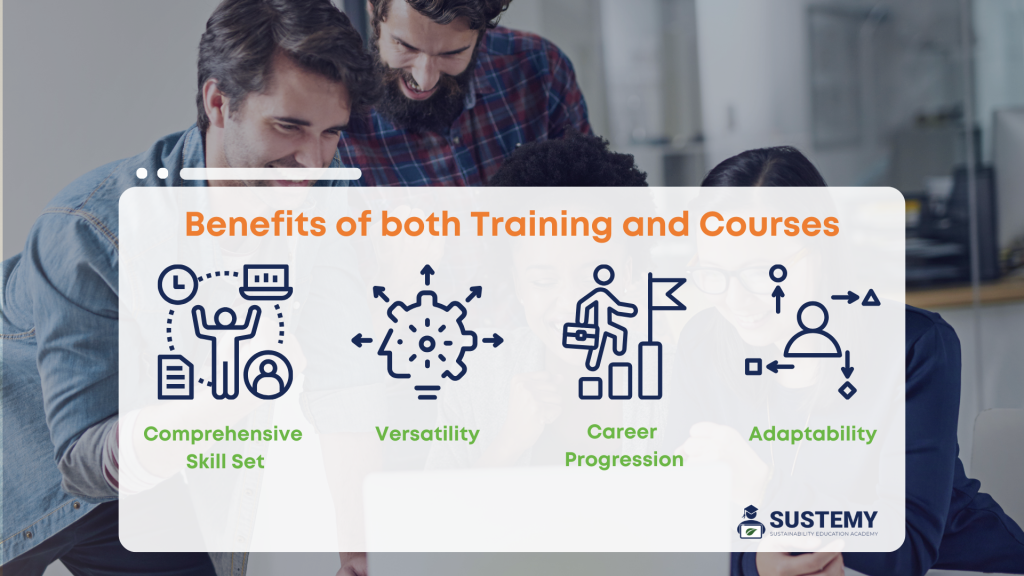In the journey of professional development, the terms “training” and “courses” often get used interchangeably. However, they are not the same, and understanding the difference between the two is essential, especially in fields like energy efficiency and sustainability. In this guide, we will unravel these distinctions and explore how they can impact your career. It’s an insight that goes beyond words and could significantly shape your professional sustainability journey.
What Is Training?
Training is the broader term of the two, encompassing a wide range of learning experiences. Think of it as the comprehensive path that leads to enhancing your skills, acquiring knowledge, and perfecting your expertise.
Training is typically practical, hands-on, and focused on achieving specific outcomes. It often involves guided learning, practical exercises, and real-world applications. When we talk about energy efficiency and sustainability professionals, the benefits of training are immeasurable.
Why Does Training Matter in Sustainability?
Training is essential for sustainability because it helps individuals develop the skills and knowledge they need to make sustainable decisions and take sustainable actions.
For example, employees who are trained on how to reduce energy consumption can help their organisations save money and reduce their environmental impact. Employees who are trained on how to compost food waste can help their organisations reduce their waste stream and create nutrient-rich soil.
Training can also help people develop the critical thinking skills they need to understand complex sustainability challenges and develop innovative solutions.
Now that we’ve established the significance of training let’s delve into the nuances of how it’s different from “courses”.
What Are Courses?
Courses, on the other hand, are structured learning programs that usually have a specific curriculum, timeline, and objectives. They are a part of the broader training process. While training provides a more holistic approach, courses are focused, structured and learning experiences designed to achieve particular goals.
In the context of energy efficiency and sustainability professionals, a course can be a component of your training journey. It’s like a building block, contributing to your overall training, skill development, and knowledge acquisition.
Why Do Courses Matter in Sustainability?
Courses matter in sustainability because they provide students with the opportunity to learn about a wide range of sustainability topics in a comprehensive and in-depth way. This knowledge can help students prepare for careers in sustainability or make more informed decisions in their personal and professional lives.
Courses can also help students develop the critical thinking and problem-solving skills they need to address sustainability challenges. Additionally, courses can provide students with the opportunity to network with other people who are passionate about sustainability.

The Benefits of the Right Mix
In the world of energy efficiency and sustainability, the right mix of training and courses can be a game-changer. Here’s why:
Comprehensive Skill Set
Training provides you with a comprehensive skill set that encompasses practical skills, hands-on experience, and up-to-date knowledge. Courses complement this by offering specialised knowledge in focused areas.
Versatility
The combination of training and courses makes you a versatile professional. You can perform a range of tasks, from energy audits to sustainability consulting, and specialise in specific areas as needed.
Career Progression
Achieving certifications often requires a combination of training and specialised courses. This is essential for career progression in the energy efficiency and sustainability sector.
Adaptability
The ever-evolving landscape of the field demands adaptability. Training keeps you updated, while courses allow you to delve deeper into specific areas as new trends and technologies emerge.
How to Choose Between Training and Courses
Now that we’ve clarified the distinctions between training and courses, the next question is, how do you choose which path to pursue?
Consider Your Goals
Your career goals and objectives should be your guiding light. If you’re aiming for a specialised role, training might be the right choice. If you want a broader understanding of sustainability, courses could be your go-to.
Practical vs. Theoretical
Think about whether you prefer hands-on, practical experience (training) or a comprehensive theoretical understanding (courses).
Combining Both
In many cases, professionals choose to combine both training and courses. This hybrid approach ensures a strong theoretical foundation coupled with practical skills.
In Conclusion
Training and courses are both essential components of professional development in the energy efficiency and sustainability field. Training equips you with practical skills, hands-on experience, and up-to-date knowledge, while courses provide structured, specialised learning experiences. A balanced approach that incorporates the best of both worlds can set you on the path to career success. Your choice between training and courses should be a reflection of your immediate needs, long-term goals, and your preferred learning style.
So, if you’re on a quest for professional growth and career advancement, remember that understanding the difference between training and courses is your compass. It’s your guide to navigating the ever-evolving landscape of energy efficiency and sustainability.
Discover the path to professional growth in energy efficiency through our comprehensive Investment Grade Energy Auditor Training at the Sustainability Education Academy.


